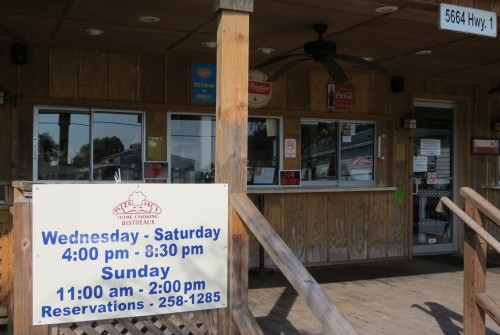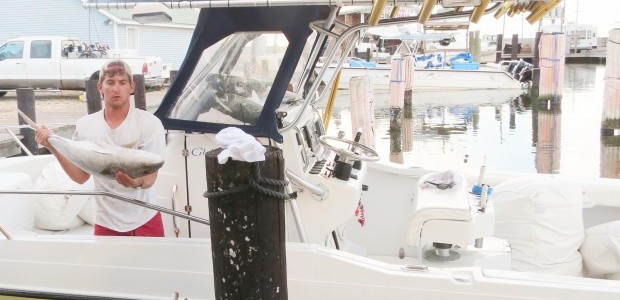
Bayou’s Best get a forum
September 5, 2012
Homestyle bistreaux finds niche in Lockport
September 5, 2012Spending more time on the water than on land is no doubt a way of life for many in southeast Louisiana, and for Capt. Ian McGowan of Apex Fishing Charters out of Grand Isle, summers are short on seeing the shore side.
“I’ll sometimes fish six or seven days in a row during the summer,” McGowan says as he pulls his 260 Canyon Runner catamaran out of Port Fourchon and into the Gulf of Mexico sunrise. “We’ll fish year round but things slow down from September ‘til around January.”
McGowan’s busy schedule this summer is a far cry from what it was two months after the February 2010 start of Apex Fishing Charters.
“I had just bought the boat when the oil spill happened and I thought I was (done) when they shut fishing down,” McGowan says. “It was scary at first, but I contracted with BP to help with the cleanup, and they paid me for the work as well as compensated me for lost business.”
Later that fall, the fishing ban for the Gulf of Mexico was lifted and McGowan went right back to making money doing something he has been doing all his life.
“Fishing picked right back up, and the past two years have been great,” he says. “I stay busy. We get a lot of people from out of state. I’ve had five or six charters out of Missouri so far this year and I get customers from Texas and Mississippi, lots of southern states, and even Wyoming, California and New Jersey.”
McGowan’s customers on a partly cloudy August day include anglers Danny Reaves of Stonewall, Louis Porter of Benton, his son, Josh Porter, of Shreveport, and Louis’s brother, Lindsey Porter, of Plaquemine. Reaves, McGowan’s uncle, had arranged the trip for the Porters.
“This is my second time offshore and their first,” Reaves, who is also a freshwater angler, says. “These saltwater fish fight way harder than freshwater fish. I caught a 50-pound catfish on a reel once, and it didn’t fight near as hard as a 30-pound fish out in the Gulf.”
As McGowan revs the boat out into the 2- to 3-foot waters of the Gulf of Mexico, Reaves and the Porters snap shots of the sun popping out from behind a bank of storm clouds clinging near the coast.
“We’re going to catch some hard tails for bait before we head the rest of the way out,” McGowan says as he pulls up to a buoy about 20 miles from shore. “Fish stack up around structure to hide from predators. We’ll also try to hit some patches of drifting grass. They hide in there, too.”
McGowan’s deckhand, Mike Andolsek of Thibodaux, rigs several rods with Hayabusa Bait Rigs, and the anglers take their turns reeling in baitfish as McGowan slowly motors the boat around the 50-to 100-foot-deep waters.
“Certain times of the year are better for certain fish, but it changes from day to day, week to week,” McGowan says. “We usually target whatever Mother Nature throws at us that day. Grouper fishing is big from August to October, but then it then gets sporadic. Tuna fishing is good year round and wahoo fishing is good during the winter.”
Once the group has dropped several baitfish into the boat’s live well, everyone settles down for the last leg of the journey – an hour ride to the edge of the continental shelf, the hallowed ground of deep-sea fishing.
“We’re going to fish for grouper on a natural bottom west of the Mississippi River delta, about 60 to 70 miles out,” McGowan says. “Out there, the water depth goes from 450 feet to 2,500 feet off the edge of the shelf.”
The roar of the boat’s twin motors can’t drown out the excitement in the Porters’ voices
“This is my first time fishing offshore,” Louis says. “Danny and I are old buddies from work. I’ve always been interested in going fishing offshore and shrimping.”
“I’ve never been fishing offshore either,” Josh says. “It’s great spending time with my pops and my uncle.”
Between 9 and 10 a.m., McGowan drops the boat into idle and his passengers are greeted with a wide-open view of deep cobalt waters and oilrigs.
“The biggest thing when fishing is patience and persistence,” McGowan says. “Be confident in what you do and stick it out. The fish are there.”
By 4:30 p.m., patience and persistence pay off, and the ice chests are loaded with one yellowfin tuna, one Warsaw grouper, three amberjack, one gag grouper, one yellowedge grouper and 21 scamp grouper. In the hours of hoisting up fish, the crew also sees a 12-foot blue marlin and 5-foot shark.
“This trip was great, all of us together, and everybody having a good time,” Reaves says as the group settles back down for the trip to shore. “It was great to see those first timers like Josh and Louis. Josh was so excited and you could tell he had the time of his life.”
“I am ready to go again,” Josh says, laughing. “I could have stayed out there and fished all day and night. Ian is a great captain, and we caught plenty of fish and had a good time.”
Bigger boats making a slower return to pre-spill business levels
Fellow offshore charter business owner Captain Steve Tomeny of Steve Tomeny’s Charters out of Port Fourchon is still working to rebound from the oil spill as well as recent hurricanes.
“Business is really down since the spill but last year was the lowest grossing year ever for me, and 2012 looks to be even lower,” Tomeny says. “I’ve got three 65-foot boats and I’m not doing as well as some of the others who have smaller boats. Fishing is good, but the economy, fishing regulations and the oil spill are some of the things affecting my business. Corporate entertaining is down too.”
Like McGowan, Tomeny also did contract work with BP and received compensation for his lost business in the wake of the oil spill.
“Once they opened the waters back up to fishing, they gave us a short weekends-only red snapper season and red snapper is what my business is built on,” Tomeny says. “With my big boats, it takes more planning to get a trip together and we didn’t know they were going to give us that red snapper season. I think I made three trips that fall. I ran more days for BP than I fished that year.”
Currently, Tomeny is only running two of his boats. With the red snapper season already closed for this year, the busiest part of the fishing season has passed for Tomeny, but he said there are still trips to be made, mainly on the weekends.
“Price is probably what is limiting business right now,” Tomeny says. “The money customers were using for these trips was their fun money and with the economy, there is not much of that anymore. I think things will pick up again but not any time soon. I would like to see some more flexibility with the red snapper season. The season used to be six months but now it’s about 40 days. Business was good when the season was six months. ”
Mike Andolsek, deckhand for Apex Fishing Charters, unloads a haul of grouper, amberjack and tuna. Capt. Ian McGowan, owner of Apex, stays busy during the summer months, hauling customers 60 miles out into the Gulf of Mexico to fish along the edge of the continental shelf.
By law, only one of these fish, a Warsaw grouper, may be kept per boat. The fish can usually be found in depths ranging from 180 to 1,700 feet.









